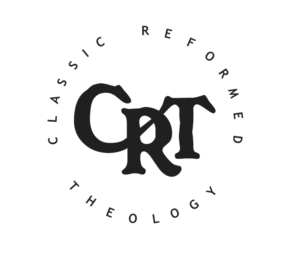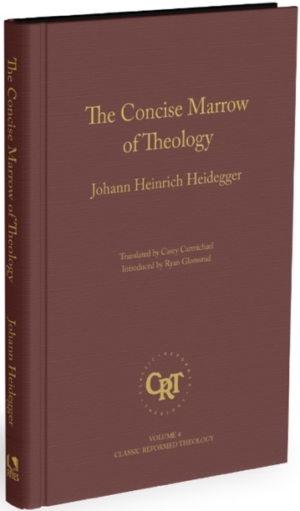Q: How is he accepted righteous before God? A: By the righteousness of Christ imputed to him [2 Col 5:21]. Q: What profit comes by being thus justified? A: Hereby and by no other means in the world, the believer shall be . . . Continue reading →
2019 Archive
A Smear Memorialized
This is the portion of the trailer for the video By What Standard? released by Founders Ministry in which video, known in the business as “B-roll,” of Rachael Denhollander is used to illustrate the words, “always having the powers, the spiritual powers . . . Continue reading →
Owen: The Promise Is Received Through Faith Alone
Fallen, sinful man stands in need of the utmost encouragement that divine condescension can extend unto, to prevail with him to receive and lay hold of the promise of grace and mercy by Jesus Christ. There is nothing that we are so . . . Continue reading →
As It Was In The Days Of Noah (26): 2 Peter 1:3–11 (part 1)
His divine power has granted to us all things that pertain to life and godliness, through the knowledge of him who called us to his own glory and excellence, 4by which he has granted to us his precious and very great promises, so that through them you may become partakers of the divine nature, having escaped from the corruption that is in the world because of sinful desire. Continue reading →
Guelzo: “The 1619 Project Is Not History; It Is Ignorance“
So, let us speak of slavery. The American republic inherited slavery from the British empire, in much the same way that it inherited its fiscal poverty, its lack of manufacturing capability, and its primitive infrastructure. We expected to overcome all of these . . . Continue reading →
Heidelcast 133: I Am That I Am (10): The Attributes Of God
In this episode we continue our consideration of the divine attributes, particularly divine immensity and immutablity. By immensity we mean that attribute whereby God fills all that can be filled with all of himself all of the time, yet so that the Creator . . . Continue reading →
Gnosticism And Christian Universalism
Universal salvation (or universalism) seems to have first emerged as a distinct religious doctrine among Christian gnostic teachers in or around Alexandria, Egypt, during the early to mid-second century CE, several decades before the influential and well-known Christian author Origen (ca. 185-251)… . . . Continue reading →
Heidegger: Good Works Are Necessary As Fruit And Evidence Of Faith
VIII. New Obedience; Good Works New obedience is exercised through good works. Moreover, there are good works, voluntary actions of the sanctified, which come from a pure heart, love of God, true faith in Christ, according to the law of God, for . . . Continue reading →
James White: The Federal Vision “Stands In Opposition To The Gospel”
How can anyone not read [the Federal Vision theology] as blatant, unvarnished sacerdotalism that stands in opposition to the gospel….
Office Hours: Carl Trueman On Luther As Theologian Of The Cross
There are few figures more central to the history of the West than Martin Luther (1486–1546). Without him there would have been no Reformation, or at least it would have looked very differently. The confessional Protestant churches, i.e., Lutherans and the Reformed . . . Continue reading →
Classic Reformed Theology Series
The Reformed faith has deep roots in the patristic and medieval church, but its emergence as a distinct tradition, growing out of the Lutheran Reformation, may be traced to the early 1520s. The development of Reformed theology as distinct from Lutheranism is . . . Continue reading →
Heidelcast 132: I Am That I Am (9): The Attributes Of God
In this episode we turn our attention from the doctrine of the Trinity to the divine attributes. Of course, in God, there are not attributes since God is what he is. Francis Turretin called the attributes “the essential properties by which [God] makes . . . Continue reading →
Heidelcast Minute: What Do We Mean By “Comfort”?
Here are all the episodes of the Heidelcast. Subscribe in Apple Podcasts. Subscribe directly via RSS Call the Heidelphone anytime at (760) 618-1563. Leave a message and we may use it in a future broadcast. If you benefit from the Heidelcast please . . . Continue reading →
New In Print: J. H. Heidegger’s Concise Marrow Of Theology
J. H. Heidegger (1633–98) was a significant Swiss Reformed theologian, in Zürich, at the end of the 17th century. This volume is a clear, accessible introduction to Reformed theology. It is not technical. It was meant to be a starting point and . . . Continue reading →
Machen’s Warrior Children, Ed Stetzer, And Beth Moore
John Frame first published his essay “Machen’s Warrior Children” in 2003, in a Festschrift (a volume of congratulatory essays usually in honor of a 65th birthday or a retirement) for Alister McGrath. The essay was ostensibly a historical analysis of what happened to . . . Continue reading →
The Federal Vision Has A Different Definition Of Faith
Here are all the episodes of the Heidelcast. Subscribe in Apple Podcasts. Subscribe directly via RSS Call the Heidelphone anytime at (760) 618-1563. Leave a message and we may use it in a future broadcast. If you benefit from the Heidelcast please . . . Continue reading →
Until December 3, 2019: On Being Reformed For $10.00
This slender volume contains four essays. One written jointly by Crawford Gribben and Chris Caughey, one by Matthew Bingham, one by D. G. Hart, and one by yours truly. Ordinarily this volume is, for its size, rather expensive. The price of the . . . Continue reading →
The Heidelberg Catechism Confesses Salvation By Grace Alone, Through Faith Alone
It has become fashionable among some who identify as confessionally Reformed and among so-called Reformedish (i.e., Baptists who identify with aspects of Reformed theology) types to claim that the Reformed doctrine of salvation hold that there two stages to salvation: initial and . . . Continue reading →
Heidelcast Minute: The Federal Visionists Deny The Protestant Distinction Between Law And Gospel
We deny that law and gospel should be considered as hermeneutics, or treated as such. We believe that any passage, whether indicative or imperative, can be heard by the faithful as good news, and that any passage, whether containing gospel promises or . . . Continue reading →
Heidelcast Minute: What Keeps Federal Visionists From Joining Rome?
Here is the original episode: Heidelcast 28 With Lane Keister: Does The Federal Vision Theology Lead To Rome? Here are all the episodes of the Heidelcast. Subscribe in Apple Podcasts. Subscribe directly via RSS Call the Heidelphone anytime at (760) 618-1563. Leave . . . Continue reading →








